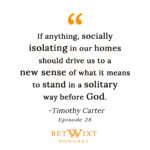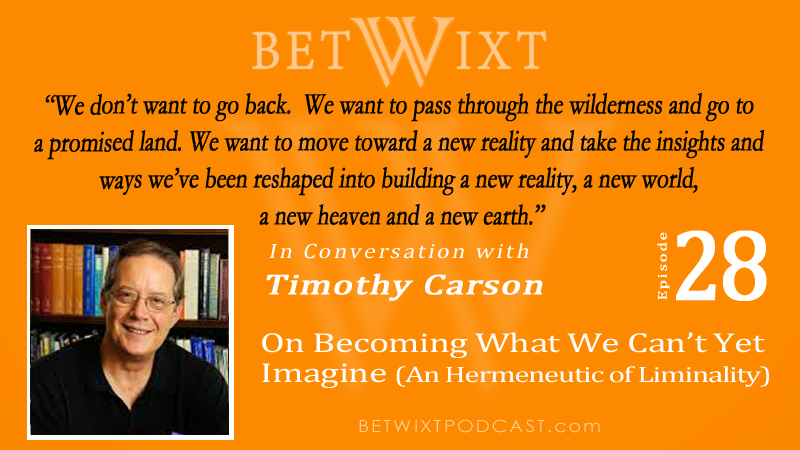
 My guest is Timothy Carson, curator of the Liminality Project. After retiring from full time pastoral ministry, Tim began to teach and write about liminality. He is the author of Liminal Reality and Transformational Power and editor of the anthology Neither Here nor There: The Many Voices of Liminality.
My guest is Timothy Carson, curator of the Liminality Project. After retiring from full time pastoral ministry, Tim began to teach and write about liminality. He is the author of Liminal Reality and Transformational Power and editor of the anthology Neither Here nor There: The Many Voices of Liminality.
And he’s working on a new collaborative book on practical theology and the development of a Biblical Hermeneutic of Liminality.
Tim also ministers as a field guide, helping others transition through life’s passages. As an Emotional Freedom Techniques Practitioner, he works with individuals who have experienced past trauma.
In this episode, Tim casts a vision toward a Biblical hermeneutic of liminality and what insight it might provide for us as we walk through this time of social liminality.
It would be a grand thing if people of faith would stop asking “When we can get back to church?” Which to me sounds like wanting to clamor back to Egypt. Wanting to clamor back to structure. What if God doesn’t want us to go back to structure?
What if God doesn’t want us to go back to the way we were before? What might we become because of this?
This Podcast relies on shares & reviews from listeners like you!
Subscribe/Rate/Review Betwixt on iTunes!
Learn more about the podcast at betwixtpodcast.com
 Links:
Links:
- Visit the Liminality Project website
Thanks to these musicians for making their work available for use:
Ryvoli: Roots; Jon Luc Hefferman: Discovery, Curious; Kai Engel: The Adumbration, Soli, Periculum, Morbid Imagination, Bells In Heaven, Endless Story about Sun and Moon, Morning Placidity, Aspirato, Modum


Missio Alliance Comment Policy
The Missio Alliance Writing Collectives exist as a ministry of writing to resource theological practitioners for mission. From our Leading Voices to our regular Writing Team and those invited to publish with us as Community Voices, we are creating a space for thoughtful engagement of critical issues and questions facing the North American Church in God’s mission. This sort of thoughtful engagement is something that we seek to engender not only in our publishing, but in conversations that unfold as a result in the comment section of our articles.
Unfortunately, because of the relational distance introduced by online communication, “thoughtful engagement” and “comment sections” seldom go hand in hand. At the same time, censorship of comments by those who disagree with points made by authors, whose anger or limited perspective taints their words, or who simply feel the need to express their own opinion on a topic without any meaningful engagement with the article or comment in question can mask an important window into the true state of Christian discourse. As such, Missio Alliance sets forth the following suggestions for those who wish to engage in conversation around our writing:
1. Seek to understand the author’s intent.
If you disagree with something the an author said, consider framing your response as, “I hear you as saying _________. Am I understanding you correctly? If so, here’s why I disagree. _____________.
2. Seek to make your own voice heard.
We deeply desire and value the voice and perspective of our readers. However you may react to an article we publish or a fellow commenter, we encourage you to set forth that reaction is the most constructive way possible. Use your voice and perspective to move conversation forward rather than shut it down.
3. Share your story.
One of our favorite tenants is that “an enemy is someone whose story we haven’t heard.” Very often disagreements and rants are the result of people talking past rather than to one another. Everyone’s perspective is intimately bound up with their own stories – their contexts and experiences. We encourage you to couch your comments in whatever aspect of your own story might help others understand where you are coming from.
In view of those suggestions for shaping conversation on our site and in an effort to curate a hospitable space of open conversation, Missio Alliance may delete comments and/or ban users who show no regard for constructive engagement, especially those whose comments are easily construed as trolling, threatening, or abusive.